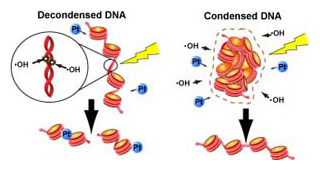Chromatin compaction protects genomic DNA from radiation damage
Press release
Chromatin compaction protects genomic DNA from radiation damage
Takata, H., Hanafusa, T., Mori T., Shimura, M., Iida, Y., Ishikawa, K., Yoshikawa, K., Yoshikawa, Y., Maeshima, K.
PLOS ONE 8(10): e75622. doi:10.1371/journal.pone.0075622
Genomic DNA is three-dimensionally organized into the nucleus, and is thought to form compact chromatin domains. Although chromatin compaction is known to be essential for mitosis, whether it confers other advantages, particularly in interphase cells, remains unknown. Here, we report that chromatin compaction protects genomic DNA from radiation damage. Using a newly developed solid-phase system, we found that the frequency of double-strand breaks (DSBs) in compact chromatin after ionizing irradiation was 5-50-fold lower than in decondensed chromatin. Since radical scavengers inhibited DSB induction in the decondensed chromatin, the condensed chromatin had a lower level of reactive radical generation after ionizing irradiation. We show that chromatin compaction also protects DNA from attack by chemical agents. Our findings suggest that genomic DNA compaction plays an important role in maintaining genomic integrity.

DNA condensation with fewer water molecules (right: condensed DNA) that there is less risk of being attacked by hydroxyl radicals. The situation is also effective to protect DNA from the binding of cisplatin (Pt).















